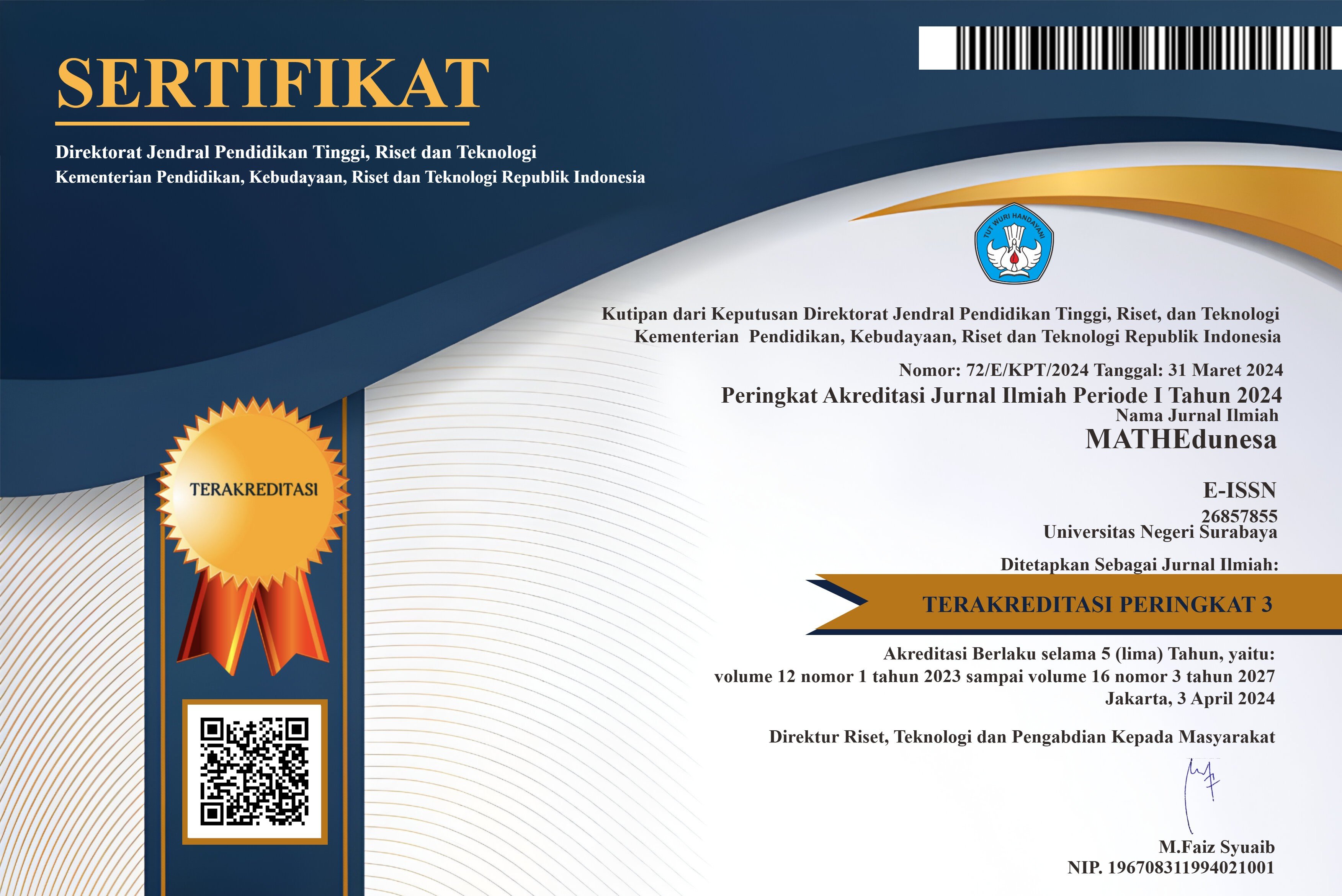Pengaruh Model Pembelajaran Kooperatif Tipe Jigsaw Terhadap Kemampuan Pemecahan Masalah Matematika
DOI:
https://doi.org/10.26740/mathedunesa.v8n2.p106-109Abstract
Abstrak
Matematika merupakan sebuah ilmu penting dalam kehidupan. Matematika bersifat abstrak, sehingga banyak siswa mengasumsikan matematika sebagai mata pelajaran yang menakutkan. Untuk meningkatkan kemampuan dalam memecahkan permasalahan matematika siswa diperlukan model pembelajaran yang sesuai dan model pembelajaran kooperatif tipe jigsaw yang salah satunya. Penelitian ini bertujuan mengetahui pengaruh pembelajaran kooperatif tipe jigsaw terhadap kemampuan pemecahan masalah matematika pada siswa kelas VIII SMP Negeri 14 Surabaya tahun ajaran 2018/2019. Jenis penelitian eksperimen ini menggunakan rancangan the one pretest - posttest design dengan jumlah populasi 402 siswa dan sampel 38 siswa. Sampel yang dipilih menggunakan teknik pemilihan secara acak. Data dikumpulkan dengan menggunakan metode tes. Analisis penelitian menggunakan metode uji normalitas, hipotesis, korelasi, dan N-Gain. Hasil penelitian menunjukkan bahwa: (1) Data pretest dan posttest berdistribusi normal, dibuktikan dengan masing-masing Dhitung pretest (0,2720) dan posttest (0,1329) yang lebih kecil dari Dtabel (0,29407). (2) Terdapat perbedaan hasil tes kemampuan pemecahan masalah matematika sebelum dan sesudah diberi pembelajaran kooperatif tipe jigsaw, dibuktikan dengan nilai thitung (-16,26) yang lebih kecil dari ttabel (-1,666). (3) Terdapat hubungan positif antara pretest dan posttest dengan pembelajaran kooperatif tipe jigsaw, dibuktikan dengan masing-masing rhitung pretest = 0,99 dan posttest = 0,97. (4) Terjadi peningkatan kemampuan pemecahan masalah matematika sebesar 0,59 yang dikategorikan dalam taraf sedang ( ). Berdasarkan analisis data penelitian dapat disimpulkan bahwa pembelajaran kooperatif tipe jigsaw berpengaruh positif terhadap kemampuan pemecahan masalah matematika siswa kelas VIII SMP Negeri 14 Surabaya.
Kata Kunci: pembelajaran kooperatif tipe jigsaw, kemampuan pemecahan masalah matematika
Abstract
The mathematics is an important science of life. Mathematics has an abstract character which makes a few students consider mathematics to be a difficult subject. The supportive learning model is needed to improve the students ability in mathematical problem-solving. One of the learning model is the jigsaw cooperative learning type. This aims to determine the influence of the jigsaw cooperative learning type on mathematical problem-solving skills in the eighth-grade class of SMP Negeri 14 Surabaya for 2018/2019 academic year. This experimental research is design by using the one pretest-posttest design. The population of these studies is 402 students with a total of 38 samples by random sampling technique. The test is used to collect the data. The analysis requirements test can use a normality test, hypothesis test, correlation test, and N-Gain test. The results of this study indicate that: (1) pretest-posttest data on mathematical problem-solving abilities are normally distributed, as proven by each Dcount pretest (0,2720) and t posttest (0,1329) which is smaller than Dtable (0,29407). (2) There are differences in the results of mathematical problem-solving test abilities before and after the cooperative learning jigsaw is given, as proven by the value of tcount (-16,26) which is smaller than ttable (-1,666). (3) There is a positive relationship between the pretest and posttest mathematical problem-solving abilities with the type of jigsaw cooperative learning, as proven by the value of each pretest count = 0,99 and the posttest count = 0,97. (4) There is an increase in mathematical problem-solving abilities of 0,59 which categorized as moderate ( ). Based on the research data analysis it can be concluded that the jigsaw type cooperative learning influences the ability to solve mathematical problems in the eighth-grade students of SMP Negeri 14 Surabaya.
Keywords: jigsaw type cooperative learning, mathematical problem-solving ability
Downloads
Downloads
Published
Issue
Section
 Abstract views: 216
,
Abstract views: 216
, PDF Downloads: 307
PDF Downloads: 307




